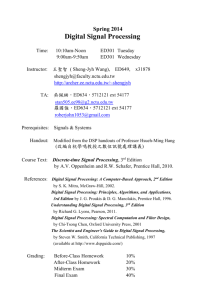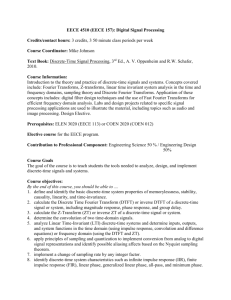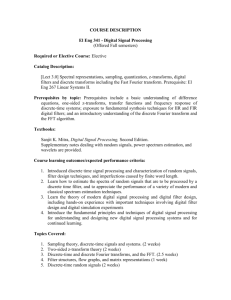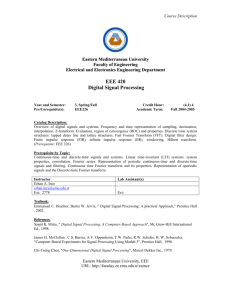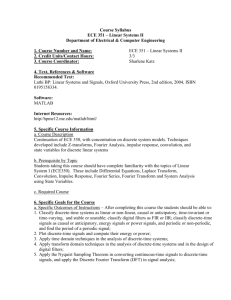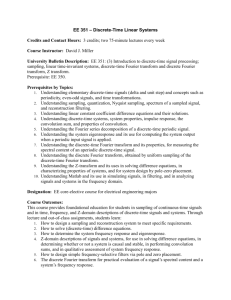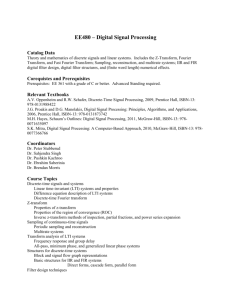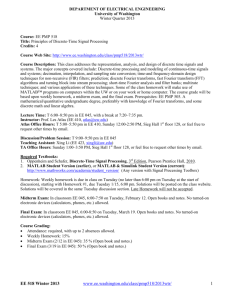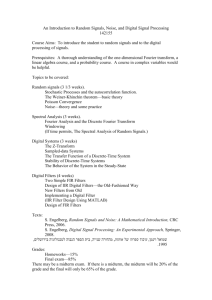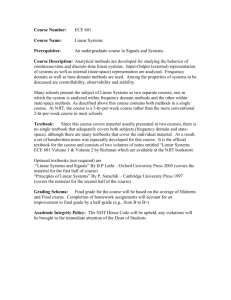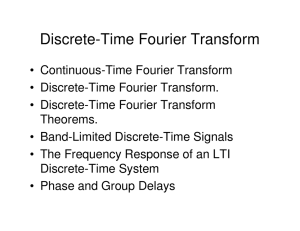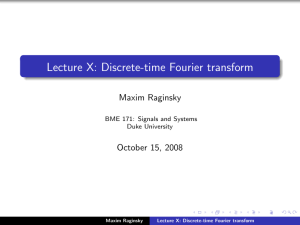EECE 4510 - College of Engineering
advertisement
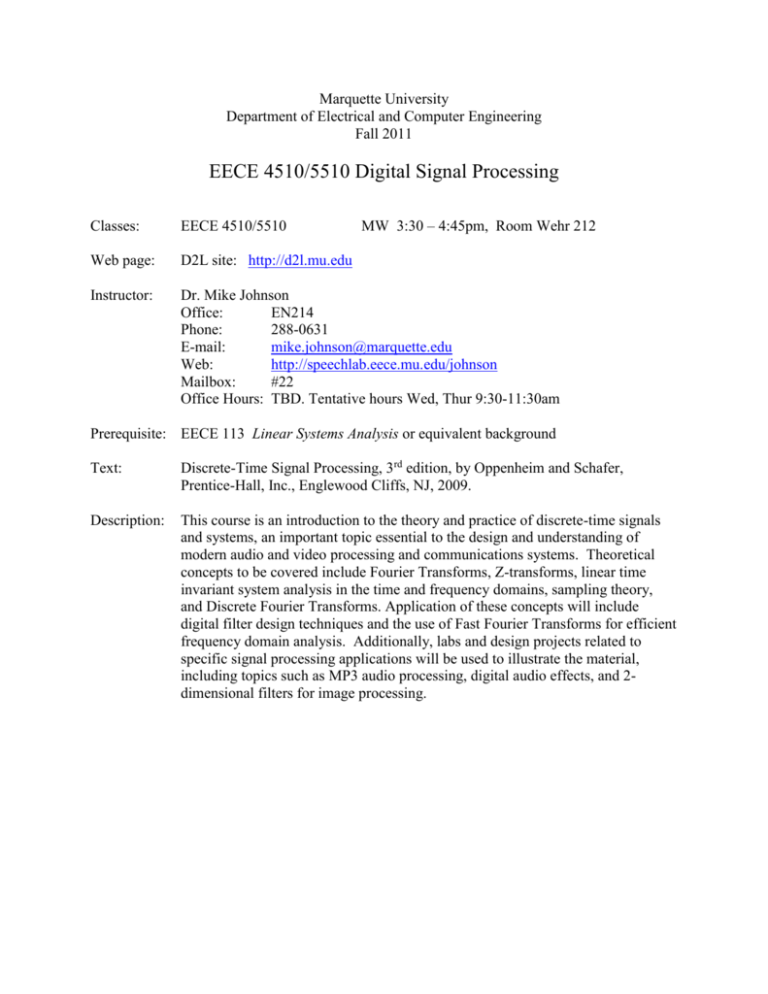
Marquette University Department of Electrical and Computer Engineering Fall 2011 EECE 4510/5510 Digital Signal Processing MW 3:30 – 4:45pm, Room Wehr 212 Classes: EECE 4510/5510 Web page: D2L site: http://d2l.mu.edu Instructor: Dr. Mike Johnson Office: EN214 Phone: 288-0631 E-mail: mike.johnson@marquette.edu Web: http://speechlab.eece.mu.edu/johnson Mailbox: #22 Office Hours: TBD. Tentative hours Wed, Thur 9:30-11:30am Prerequisite: EECE 113 Linear Systems Analysis or equivalent background Text: Discrete-Time Signal Processing, 3rd edition, by Oppenheim and Schafer, Prentice-Hall, Inc., Englewood Cliffs, NJ, 2009. Description: This course is an introduction to the theory and practice of discrete-time signals and systems, an important topic essential to the design and understanding of modern audio and video processing and communications systems. Theoretical concepts to be covered include Fourier Transforms, Z-transforms, linear time invariant system analysis in the time and frequency domains, sampling theory, and Discrete Fourier Transforms. Application of these concepts will include digital filter design techniques and the use of Fast Fourier Transforms for efficient frequency domain analysis. Additionally, labs and design projects related to specific signal processing applications will be used to illustrate the material, including topics such as MP3 audio processing, digital audio effects, and 2dimensional filters for image processing. Outline: Topic Text (optional/advanced) Introduction Discrete-time signals The Fourier transform The z-transform Sampling theory Linear time-invariant systems and analysis Implementation structures for discrete systems Filter design techniques The discrete Fourier transform Fast Fourier transform techniques Additional Topics Chapter 1 2.0-2.6 2.7-2.9 (2.10) 3.0-3.5 4.0-4.7 (4.8-4.9) 5.0-5.7 6.0-6.5 (6.6-6.10) 7.0-7.6 (7.7-7.9) 8.0-8.7 (8.8) 9.0-9.3, (9.4-9.7) TBA Course Objectives: By the end of this course, you should… 1. Understand what constitutes a discrete-time signal or system, and define and identify the basic properties of memorylessness, stability, causality, linearity, and time-invariance. 2. Understand the concept of sampling and quantization of continuous-time signals and the importance and application of the Nyquist sampling theorem. 3. Understand the relationship between continuous-time signals and their discrete-time counterparts in both the time domain and the frequency domain. 4. Understand the Discrete Time Fourier Transform (DTFT) and be able to use it to characterize discrete-time signals. 5. Understand the Z-Transforms (ZT) and be able to use it to characterize discrete-time signals. 6. Be able to characterize Linear Time-Invariant (LTI) discrete-time systems in the time domain using impulse response, convolution and difference equations. 7. Be able to characterize LTI discrete-time systems in the frequency domain using the DTFT and the ZT. 8. Understand the basic concepts of infinite-impulse-response (IIR) systems, finite-impulse-response (FIR) systems, linear phase systems, and minimum phase systems. 9. Be able to determine the stability and causality of discrete-time systems in both the time and frequency domains. 10. Be able to represent discrete-time systems using block diagrams and signal flow graphs. 11. Be able to implement discrete-time systems using direct, cascade, and parallel structures. 12. Be able to design IIR filters using impulse invariance and bilinear transforms. 13. Be able to design FIR filters using windowing. 14. Understand the Discrete Fourier Transform (DFT), know how to compute it using the Fast Fourier Transform (FFT), and understand its relationship to the DTFT and Fourier Series. 15. Be able to implement frequency-domain filtering operations using either overlap-add or overlap-save methods. 16. Be able to use Matlab and Labview to perform signal processing design tasks. 17. Be able to implement simple filters and signal processing methods on a digital signal processing hardware platform. GRADES Grading: Homework: Projects: Midterm exam: Final exam (cumulative): Grading Scale: 90 85 80 75 70 65 60 Graduate credit: Students taking this course for graduate credit (EECE 5510) will have additional reading and additional problems assigned on homework, projects, and exams, which may include advanced material or topics. Attendance: Attendance is required, per College of Engineering policies. There is no penalty for excused absences (must be pre-approved). Excessive absences may result in being dropped from the course. Late Assignments: Late assignments are penalized 10% the first day and 5% each additional day, up to a maximum penalty of 50%. Late assignments will not be accepted past the last class day or if solutions have been posted. Academic Honesty: Refer to the Marquette College of Engineering policy at: http://www.eng.mu.edu/pages/Home/Current_Students/Academic_Polici es/Academic_Dishonesty, as well as to my policy at: http://speechlab.eece.mu.edu/johnson/Academic_Dishonesty.pdf x x 90 x 85 x 80 x 75 x 70 x 65 x 60 20 % 25 % 25 % 30 % A AB B BC C CD D F Working in groups is both allowed and encouraged, but any work turned in for grading must be completely your own. Any and all reference material used must be shown clearly and credited accordingly. The use of files from previous offerings of this course is permitted for study purposes. When in doubt, ask me first. Midterm Exam: Monday October 17, in class Final Exam: Friday December 16, 10:30am-12:30pm, EN388
